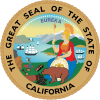Fair Pay to Play Act
| Fair Pay to Play Act | |
|---|---|
 | |
| California State Legislature | |
| Full name | Fair Pay to Play Act |
| Introduced | February 4, 2019 |
| Assembly voted | September 9, 2019[1] |
| Senate voted | May 22, 2019[1] |
| Signed into law | September 30, 2019 |
| Sponsor(s) | Sens. Nancy Skinner, Scott Wilk, Steven Bradford |
| Governor | Gavin Newsom |
| Code | Education Code |
| Resolution | SB 206 |
| Website | leginfo.legislature.ca.gov |
Status: Current legislation | |
The Fair Pay to Play Act, originally known as California Senate Bill 206,[2] is a California statute that will allow collegiate athletes to acquire endorsements and sponsorships while still maintaining athletic eligibility.[3] The bill would affect college athletes in California's public universities and colleges.
History
[edit]The bill was introduced by Senator Nancy Skinner[4] and co-authored by Scott Wilk and Steven Bradford.[5] The bill passed the California State Senate 31 to 5, with Shannon Grove voting against the bill, on May 22, 2019,[6] with the California Assembly unanimously passing it on September 11, 2019.[7] The bill was bolstered by testimony from former Stanford women's volleyball star and 2015 national freshman of the year Hayley Hodson, and Oklahoma State University football star Russell Okung.[8][9][10][11]
The impetus for the bill came when Skinner met antitrust economist Andy Schwarz.[12][13] Schwarz had been involved in the O'Bannon litigation and was looking for a new way to advance athletes rights after that case had resulted in only modest gains.[14]
The Supreme Court's recent decision in NCAA v. Alston sheds light on modern federal attitudes towards student athlete compensation.[2] In this case, the Court struck down any potential limitations on education-related benefits that student athletes may receive.[2] Most notably, the Court—and especially Justice Brett Kavanaugh—rejected the NCAA's "amateurism" argument as an overly broad and outdated defense for failing to allow its revenue-drivers (i.e., student athletes) to receive compensation.[15] The NCAA contended that the Court should defer to its amateurism model because it is a joint venture along with its member schools, but the Court instead reasoned that deference was inappropriate since the NCAA has a monopoly in the relevant market.[15] The Court further rejected the NCAA's appeal that it was not a "commercial enterprise," noting the "highly profitable" and "professional" nature of certain college sports.[15] Shortly after the Court's decision in Alston, the NCAA issued an interim name, image, and likeness policy which permits student athletes to earn this type of compensation.[16] States have also followed suit by enacting their own laws.[17] For example, Illinois Public Law 102-0042 permits athlete to receive market-value compensation for use of their name, image, and likeness.[18]
Gavin Newsom signed the bill into law on September 30, 2019. The law was scheduled to go into effect in 2023, but was moved up to an effective date of September 1, 2021 thus enabling student-athletes to own their own name, image, and likeness, and profit from them, just like any other college student or citizen can.[19][20]
References
[edit]- ^ a b "SB-206 Collegiate athletics: student athlete compensation and representation". California Legislature Information. Retrieved September 13, 2019.
- ^ Anantharaman, Maitreyi (September 10, 2019). "California Lawmakers Pass Bill Allowing College Athletes To Profit From Endorsements". Deadspin. Retrieved September 13, 2019.
- ^ Scott, Jason (February 2019). "California Lawmaker Introduces 'Fair Pay to Play Act'". Athletic Business. Retrieved September 13, 2019.
- ^ Anderson, Bryan (February 6, 2019). "College athletes could soon get paid in California, but not from the NCAA". The Sacramento Bee. Retrieved September 16, 2019.
- ^ "California Legislature OK's SB 206, 'Fair Pay to Play Act'". SCVTVNews. September 13, 2019. Retrieved September 16, 2019.
- ^ McWilliams, James (June 14, 2019). "A CALIFORNIA BILL WOULD LET COLLEGE ATHLETES SIGN ENDORSEMENT DEALS, IN SPITE OF THE NCAA". Pacific Standard. Retrieved September 16, 2019.
- ^ Ackerman, Nathan; Sturges, Amanda (September 11, 2019). "California passes Fair Pay to Play bill". Daily Trojan. Retrieved September 16, 2019.
- ^ Chuck Culpepper (June 30, 2021). "This state senator once caused McDonald's to change. No wonder she took on the NCAA". The Washington Post. Washington, D.C. ISSN 0190-8286. OCLC 1330888409.
- ^ "Senators Bradford and Skinner Respond to NCAA's Announcement on Name, Image, and Likeness". April 30, 2020.
- ^ Mello, Felicia (July 3, 2019). "Should college athletes profit from their prowess? NCAA says no, but California may say yes". Calmatters.
- ^ "If college athletes could profit off their marketability, how much would they be worth? In some cases, millions". USA Today.
- ^ "How California paved the way for college athletes to cash in big". Los Angeles Times. July 1, 2021. Retrieved April 27, 2023.
- ^ "The California governor signed a law to let NCAA athletes get paid. It's unclear what's next". The Washington Post. September 10, 2019. Archived from the original on February 27, 2023.
- ^ "Sports economist Andy Schwarz '89 answers key O'Bannon v. NCAA questions". December 12, 2014. Retrieved May 3, 2023.
- ^ a b c https://www.supremecourt.gov/opinions/20pdf/20-512_gfbh.pdf [bare URL PDF]
- ^ http://ncaaorg.s3.amazonaws.com/ncaa/NIL/NIL_InterimPolicy.pdf Archived September 26, 2021, at the Wayback Machine [bare URL PDF]
- ^ Tepen, Luke (January 2021). "Pay to Play: Looking Beyond Direct Compensation and Towards Paying College Athletes for Themselves". Washington University Journal of Law & Policy. 65 (1): 213–246.
- ^ "Illinois General Assembly - Full Text of Public Act 102-0042".
- ^ Murphy, Dan (September 30, 2019). "California defies NCAA as Gov. Gavin Newsom signs into law Fair Pay to Play Act". ESPN.
- ^ "Skinner and Bradford Move up Effective Date of Fair Pay to Play Act to Sept. 1, 2021". June 21, 2021.
